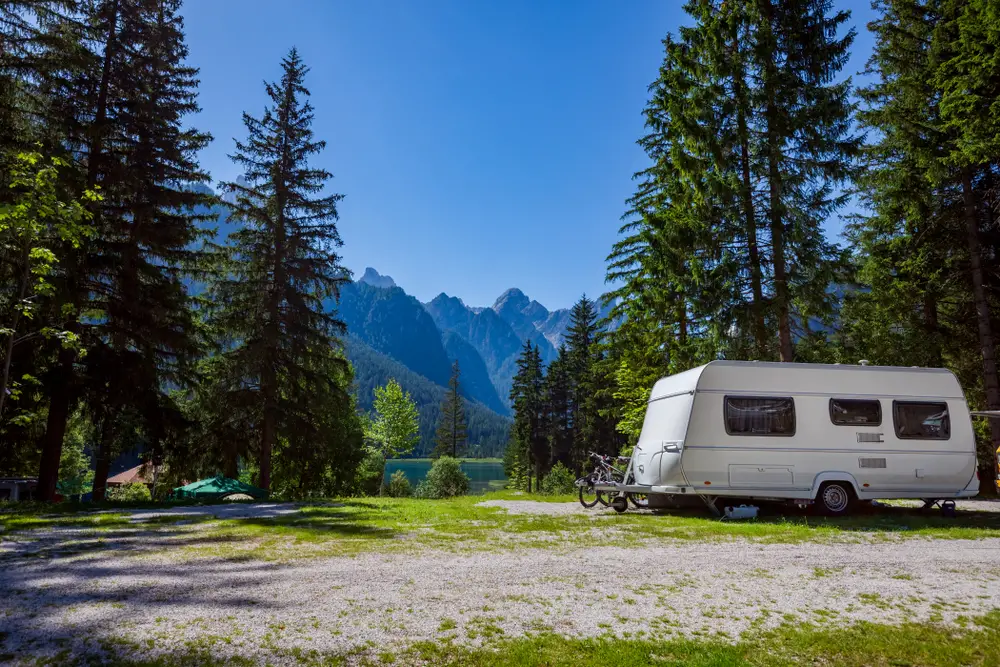The average cost of a campsite will depend on where you’re camping, what season you’ll be camping in, and if you’re pitching a tent or renting a sizable space for your RV.
On average, most trailer spaces in a campsite with access to power and water will cost you $45 a night and an entrance fee for campsites for tent camping is around $45 if you’re going to make full use of the utilities as well.
Camping during peak season, from May to September will incur higher costs as there is an increased demand for camping spots. You’ll probably have to pay around $5-$10 more a night than you usually would, but this is still minor when you consider hotel costs.
If you and your family are keen campers, then maybe investing in a yearly pass would be a more cost-effective investment as it may only set you back around $80, and then you’ll be able to use the campsite as much as you want.
How much does it cost for camping?
The cost of camping for an average trip could cost around $1,000 depending on what time of year you’re going, how long you’re camping for, and how many people are going.
Whilst camping is a more cost-effective vacation than taking a flight, the costs can still add up when you need to buy everything you need for your trip.
On top of the cost of hiring a space in a campsite, you’ll also need to consider your travel expenses for fuel, camping equipment, and any you need to buy to bring on your trip.
Here is a list of the most common things people buy for camping and the average cost of them
- 4-man tent – $50-$300
- Sleeping bags – $30 each
- Airbed – $50 each
- Portable grill – $50-$300
- Cooler box – $50
- Chairs – $40 each
- Camping lighting – $25 each
- Food & Drink – $30 a day
- Kitchenware – $50
So if you were to buy all these camping supplies above for your trip, the total cost would be around $875, however, you may not need these supplies for a shorter trip or you may already have camping equipment which would prevent you from having to purchase more.
Let’s say it costs you $50 in fuel to fill up your vehicle for the trip, you’re staying on a campsite for a week for $45 a night and you’ve needed to buy all the supplies above for your tip.
You could be looking at spending over $1000 for your camping trip, give or take some for extra expenses or day trips you may take.
Why is camping so expensive?
The price of camping can vary depending on which state you’re camping in and what season you choose to go.
The cost of hiring a space at a campsite can be the largest cost for your trip, this is because these campsites have to pay to run all the amenities that they do, for example, public showers, power supplies, and even laundry rooms.
Some states have a higher cost of living than others, so campsite owners will need to charge more in order to survive financially and to help pay for the land that they own. Popular tourist destinations will have a higher cost of living, so you’ll need to pay more to stay at their campgrounds.
Camping is more expensive for people who are doing it for the first time as they will need to purchase all the camping equipment before their trip, although, on their next trip they’ll already have the required equipment which will then save them a big chunk of money.
Camping in the winter will save you a ton of money, as there is very little demand for spots in campsites so campground owners are willing to lower their prices to entice customers. So if you are hoping to stay more on a budget, try not to go during the peak summer season.
Overall though, camping is a way cheaper vacation option in comparison to booking a flight for the whole family, especially when you consider that you’ll be more likely to buy more meals out during the day on a more formal vacation.
How much should you pay for a tent?
The cost of your tent should depend on the size, features, quality, and weight. If you’re looking to buy a 6-10 person tent, then you’ll need to spend upwards of $500 to find a high-quality one.
2-person tents can be fairly inexpensive though, but you will be restricted on space and many people prefer to go for a bigger-sized tent even fewer people are camping.
